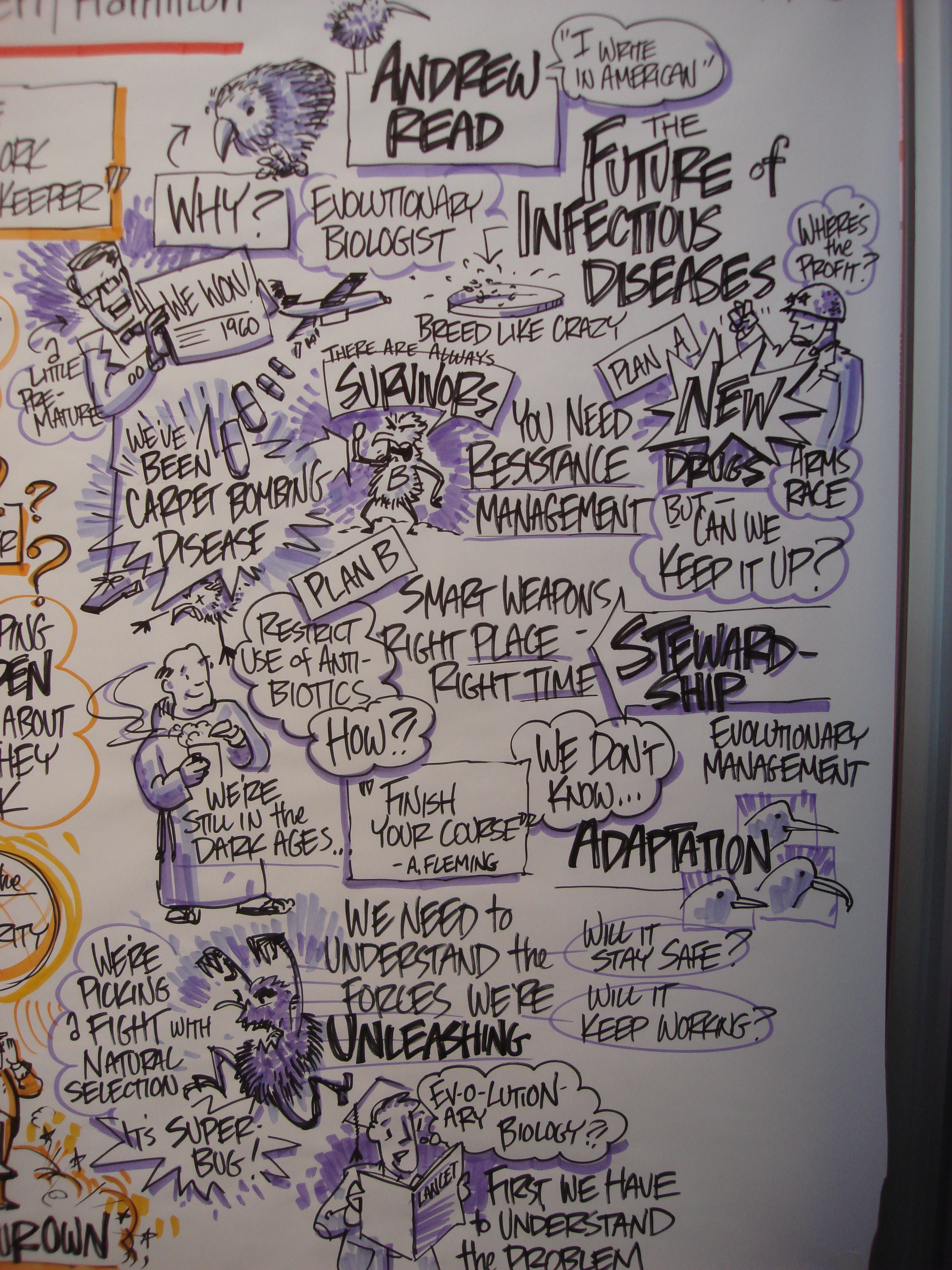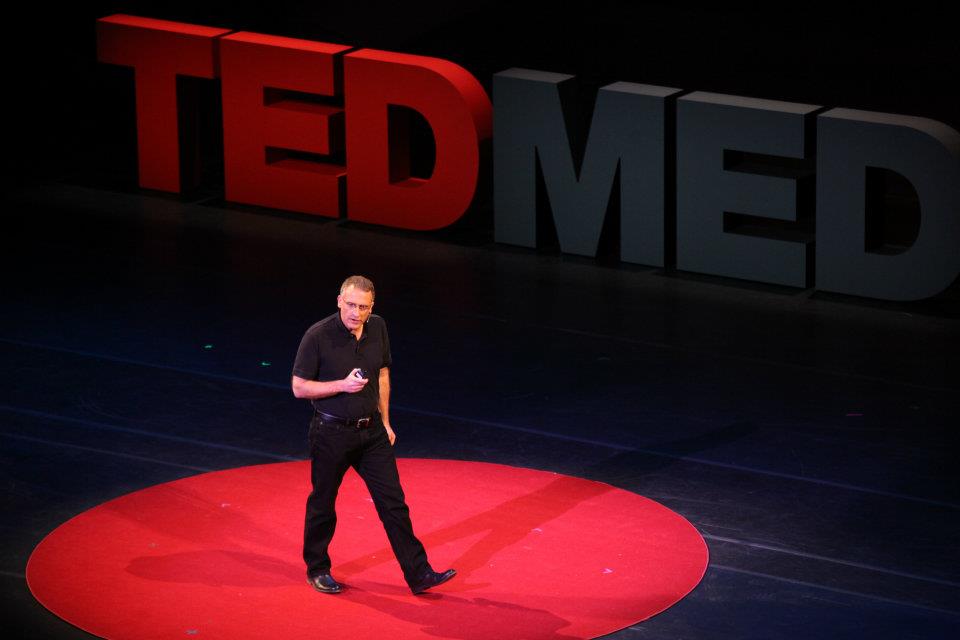Thanks for your interest in my TEDMED talk. A Ted talk is brutally short. Here I give leads to pursue things further. You can see more about what my research group does on the other pages on this site. Don’t hesitate to get in touch if you have questions or disagreements. Enthusiasm and agreement also welcome.
Alternative media
If you enjoyed my accent but couldn’t understand a word I said during my Ted talk, try a story I wrote for Penn State Alumni or a recent press release. The arguments are made more thoroughly in this article. Don’t be put off the article because it looks like boring science geek stuff; I made a huge effort to make it readable by anyone who hungers for more depth than a twitter post. Alternatively, this is how the talk looked to graphic facilitator Jim Nuttle of alphachimp studio:
The alphachimp folks were at TedMed courtesy of Booz Allen Hamilton.
The resistance problem
For a very up-to-date discussion of the resistance problem, see the World Health Organization’s latest report. That report also has a very good summary of the economic challenges facing the drug discovery pipeline (what I called ‘Plan A’) and the difficulty of getting doctors and patients to do what is good for them AND their communities. It also inadvertently makes my point that the science of evolutionary management is very primitive. The difficulties of market solutions to resistance evolution are also well summarized by The Economist. If you want more, the Infectious Disease Society of America (including some heart-breaking patient stories), the CDC, or the CDDEP.
How should we treat patients?
I asserted that we have to manage the evolution driven by medicine, but that we have only a rudimentary knowledge base to do it. I illustrated that argument with the claim that when patients finish their drug courses as advised, they are imposing two mutually contradictory evolutionary forces (what my colleagues and I called the ‘double edge sword of resistance management’). I don’t think you can figure out from an arm chair which force dominates in any particular situation. We summarized these arguments in what I hope is easily accessible prose here. (Because we made it easily accessible, other scientists described it as verbal handwaving. If experiments make you feel better, you can find one of ours here. If mathematics reassure you, try this.) Reactions to our arguments among scientific colleagues have varied from ‘it’s obvious’, to ‘what an interesting argument‘, to data-free outrage.
As to the physician quote “Listen Andrew, we pay ill-informed lip service to resistance management, and then get on with treating our patients”: The colleague who said that to me gave me permission to use the quote, but on pain of death should I reveal his/her identity. So far as I can tell, s/he is one of the finest and best-intentioned infectious disease physicians in America.
It’s early days for the science behind our ‘double-edged sword’ argument. It’s what a large chunk of my research group is currently working on (funded by the NIH). Please do remember what I said in my talk: keep following your doctor’s advice. It might be right, and I might be wrong. My point is that we currently don’t know for most infectious diseases.
Adaptation science
For an introduction to evolutionary thought, Understanding Evolution is an excellent start. If you want to properly understand natural selection (and everyone should), you can’t go past G.C.William’s classic book. Why that book was so important, and why it leads directly to medicine, is very nicely summarized in Steve Stearns’ recent obituary of Williams. The outstanding work by Peter and Rosemary Grant and their colleagues on the natural selection and adaptation in Darwin’s finches on the Galapagos Islands is summarized in a monograph and in a gripping trade book. For a lead into the really amazing work on slime mold adaptation, start with the Strassman/Queller website or this NY Times piece by Carl Zimmer.
Evolution-proofing
Our paper on an evolution proof control of malaria which got rejected by The Lancet is here. It got a fair bit of media coverage, which includes a lot of interesting reaction from experts. The best news story was in The Scientist, which fairly contrasts our opinions about the pros, cons and feasibility with the opinions of other experts with whom we do not agree. Other ideas for evolution-proofing (though the authors might be horrified at the phrase) come from Koshony, Andre and Godelle and Pepper.
I discuss the sort of science needed to do rational evolutionary management at the end of our controversial PNAS paper (third to last page). A particularly fine study was done by Penilla et al., described in Box 1 in this paper (for copyright reasons I can not post the original Penilla paper). A really fine (and sobering) example of the effects of drugs when drug resistance is around is Harrington et al. That study is a great example of what I mean when I say we need to ask ‘Will it stay safe and will it keep working’ in addition to the standard ‘Is it safe and does it work’ questions we ask in pre-release clinical trials.
For specific examples of the practical consequences of an evolutionary perspective, try this paper we wrote about the very serious issue of drug resistance in malaria. It looks technical, but again we tried to make it accessible.
Kakapo
Kakapo ARE cool. For a quick overview of the birds, and the conservation efforts to save them, check this out. It can be a bit slow to load, but hang in there. Someone is doing a great job on the kakapo entry in Wikipedia, and there is even a list of all kakapo known since the birds were rediscovered in the 1970s.
Medicine and the E-word
Do words matter? Check this out.



